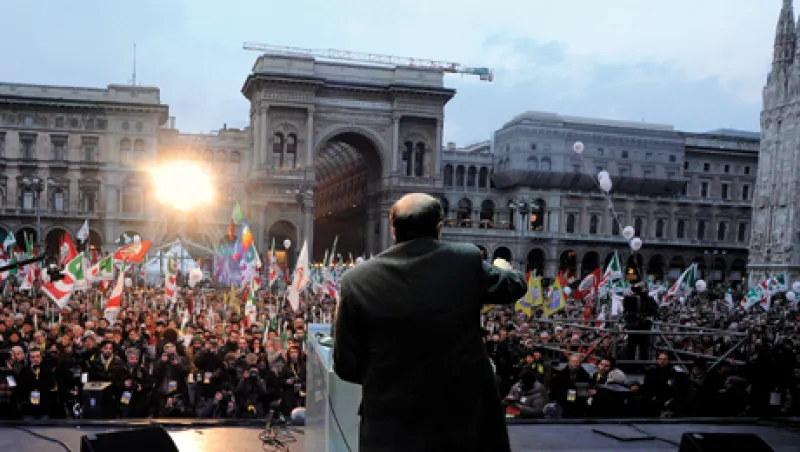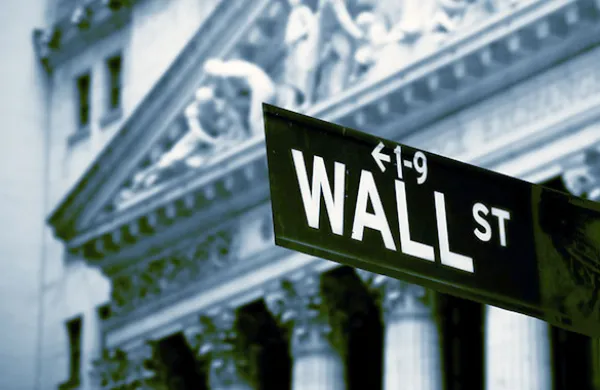IT HAS BEEN A DREADFUL YEAR FOR PAOLO FATO, the owner of a small company in Milan that makes paper trash bags for Italian municipalities. His prime customers, cities and towns that used to settle their bills within 60 days, now wait six months or longer. In the past he could finance his unpaid invoices at Italian banks in a process known as factoring, but the widespread credit crunch gripping Italy has closed down that avenue.
“Municipalities are taking longer to pay, and the banks have shut off the taps to Italian business,” Fato tells Institutional Investor. “The result is that companies are simply dying. I’m talking hundreds of small companies a day are closing their doors.”
For Italy, where two thirds of businesses are small or medium-size enterprises like Fato’s, which employs 15 people, the economic outlook has only gotten worse as a result of the inconclusive February parliamentary elections. Voters gave the center-left coalition led by the Democratic Party of Pier Luigi Bersani a majority in the Chamber of Deputies, the lower house of Parliament, but left the Senate, the upper house, effectively deadlocked, with the center-right coalition of former prime minister Silvio Berlusconi winning nearly as many seats as Bersani and his allies. The result deprived the left of the majority needed to pass legislation.
Further complicating matters, the Five Star Movement, a political protest group headed by comedian Beppe Grillo, won a quarter of the vote and enough seats to affect the formation of a new government. Grillo campaigned to overturn what he considered a corrupt old order but offered little in the way of a platform to get Italy out of its economic decline. The party’s big slice of the vote reflected popular disillusionment with the austerity program put in place by Mario Monti, the technocrat who had governed as prime minister for the previous 15 months. Grillo’s refusal to form a ruling coalition with one of the two major parties means that whatever government emerges is likely to have a tenuous grip on power.
Bersani succeeded last month in getting two members of his alliance, both political neophytes, elected as the speakers of the two houses, but his Senate candidate, former anti-Mafia prosecutor Pietro Grasso, won the post with less than a majority, underscoring the difficulty of governing. Most analysts believe Italy will face fresh elections within a year.
The political stalemate is likely to hinder an economy already in recession, making companies reluctant to invest or hire, banks hesitant to write new loans and consumers inclined to tighten their belts, says Alberto Gallo, London-based head of European macro credit research at Royal Bank of Scotland Group. “The risk is you get a stall in the economy, where big decisions are not taken by the big economic players,” Gallo says.
One sign of the problem: Rates on Italian debt remain elevated, although well off the peaks hit at the height of the crisis last year. Yields on ten-year government bonds spiked to 4.93 percent after the election, from about 4.0 percent in January, before easing back to 4.59 percent on March 21. Interestingly, Italian yields showed little lasting impact from Cyprus’s initial rejection of a European bailout plan that would have taxed bank deposits, suggesting that investors believe Cyprus’s woes won’t have a contagion effect on the broader euro zone. Spain, which had to seek a €40 billion ($51.5 billion) European bailout of its banking sector last year, saw its ten-year bonds trade at a yield of 4.88 percent on March 21.
Riccardo Barbieri, London-based chief European economist at Mizuho International, cut his economic forecast for Italy because of the electoral gridlock; he predicts that the country’s GDP will contract by 1.5 percent in 2013, compared with his previous estimate of –1.1 percent. The economy is suffering from Monti’s decision to proceed with tax hikes and budget cuts at a time when Italy was mired in recession. “I don’t think Monti had much of a choice,” Barbieri says. “He was appointed prime minister with the mandate to do things Berlusconi didn’t feel like doing.”
In their campaigns both Berlusconi and Grillo called for reversing Monti’s tax hikes. Bersani was more ambiguous, promising to maintain the prime minister’s reforms while also implementing a “pro-growth” program, but never explaining how to reconcile the two.
Any move to ditch the Monti measures could cause rates on Italy’s debt — which stands at a massive 127 percent of GDP — to rise further, analysts say. Italy’s European Union allies are unlikely to endorse any stimulus program by Rome, having offered such fulsome support to Monti. “Because of the problems other large European economies are having, there is now greater pressure to relax the austerity, but I think for Italy it will stay where it is for now,” says Barbieri.
Since the elections the gridlock has been a rising concern for institutional investors. On March 8, Fitch Ratings announced that it had downgraded Italy’s long-term sovereign credit rating one notch, to BBB+ from A–. Standard & Poor’s and Moody’s Investors Service downgraded Italy by two notches last year, to BBB+ and Baa2, respectively.
“The increased political uncertainty and non-conducive backdrop for further structural reform measures constitute a further adverse shock to the real economy amidst the deep recession,” Fitch said, adding that a recent fall in employment and sentiment indicators increased “the risk of a more protracted and deeper recession than previously expected.” Fitch forecasts that Italian GDP will fall by 1.8 percent in 2013.
The Italian news media have been fixated on the impressive amount of votes received by the Five Star Movement, especially among young people, who cast almost half their votes for the upstart party. But Grillo talks about reforming the entire electoral system in Italy — an ambitious agenda that could take years to realize — rather than implementing a pro-growth economic program, which the country urgently needs.
Bersani has proposed issuing special government bonds to provide financing to municipalities so they can pay off their obligations to private companies. The idea is to allow municipal governments to settle their accounts on an accelerated basis and bring Italy into line with countries like France and Germany for the time it takes local governments to pay their bills.
For small businessmen like Fato, such a move would be a lifesaver. “If we could solve the problem of payments by public bodies, which represent 17 percent of purchases on a national basis, there would be a boom in Italy’s economy immediately,” he says.
It is possible that an ad hoc coalition of Bersani’s Democrats and Berlusconi’s right-wing allies could come together to pass such legislation without the Five Star Movement, but such a deal might require months of negotiations. Talks began in mid-March, with President Giorgio Napolitano meeting with party leaders, but because Napolitano’s term expires in mid-May, the presidency is one more complicated piece of the political puzzle. Berlusconi’s People of Freedom party has suggested that it would support Bersani as prime minister if the left would endorse a Freedom candidate for president, but that seems unlikely, as the Democrats are drawing up conflict-of-interest rules aimed at preventing Berlusconi from serving in any official capacity.
In addition to overdue bills, another major problem for Italian companies is the pervasive credit crunch stifling the flow of funds to industry. Multinational companies have been able to tap the bond market for financing, but most small and medium-size businesses depend on bank loans to run their operations. Before the election banks were stingy about making new loans, but at least they were rolling over old ones. Now, however, even that lifeline has been largely cut off, according to RBS’s Gallo.
“It’s one of the biggest problems facing small and medium-size companies and has brought a lot of anxiety into the market,” says Vincenzo Boccia, president of the small-business section of Italian business lobby group Confindustria. “The world of credit is becoming ever more selective and less and less inclusive.”
“The crunch in Italy is that banks are simply not willing to lend,” says Fabrizio Bernardi, a banking analyst at Fidentiis brokerage in Milan. “If I am a shareholder, I don’t want banks to lend to anybody who can’t pay.” Just one indicator of the crunch: Last year mortgage lending plunged by 50 percent from the previous year. Output in the construction sector was down 15 percent in December from the same period a year earlier, a decline twice as severe as the EU average, according to the European Union’s statistical agency, Eurostat.
Statistics from the Bank of Italy bear out the trend. According to the central bank, loans to nonfinancial companies fell 2.8 percent in January (the last month for which statistics are available) from a year earlier.
One reason for the decline is a lack of demand, says Vincenzo Chiorazzo, head of economic analysis at the Association of Italian Banks. With the economy in a double-dip recession, few companies are looking to borrow for investment projects. Most companies are seeking loans to refinance existing debts, he says.
Yet even those rare companies looking to expand are often getting a cold shoulder from banks. Take the example of Jacopo Moschini, who runs a Milan-based website called MyChicJungle. The site brings small businesses together with larger companies that might be interested in their services. With half a dozen employees, Moschini is ready to expand and hire new workers — if he can get financing. “We asked many banks, but they all said they will not provide financing to a start-up,” he says. “This means we cannot grow, which is ironic because at this moment what Italy really needs are businesses that create innovation.”
The biggest reason banks are reluctant to lend is a dramatic rise in nonperforming loans, says the banking association’s Chiorazzo. Why extend fresh credit if you’re having trouble collecting on previous loans? NPLs stood at €126.1 billion in January, up 18 percent from a year earlier and at the highest level in 12 years, according to the association. The NPL ratio as a percentage of total loans rose to 6.4 percent from 5.4 percent a year earlier.
The Bank of Italy has instructed banks to increase provisions and banned banks with tier-1 capital ratios of less than 8 percent from paying dividends. With provisions averaging about 40 percent of NPLs, Italian banks are well below the European norm of 53 percent. Analysts at Mediobanca Securities estimate that Italian banks would have to set aside an additional €21 billion in provisions to meet the central bank’s request.
UniCredit, Italy’s largest bank, reported a net loss of €553 million in the fourth quarter after tripling loan-loss provisions, to €4.6 billion. No. 2 Intesa Sanpaolo posted a loss of €83 million in the quarter after making provisions of €1.5 billion. Stocks of both banks have been pummeled. UniCredit was trading at €3.64 a share on March 21, down 12.1 percent from a year earlier, while Intesa was off 20.35 percent at €1.21. After the elections authorities in both the U.K. and Italy ordered a moratorium on the shorting of Italian financial stocks.
In January the Italian government approved a €4.1 billion bailout for Banca Monte dei Paschi di Siena. The bank, the oldest in Italy, had acquired Banca Antonveneta from Spain’s Banco Santander for a hefty €9 billion in 2007, only to see the global financial crisis drastically reduce the value of the Padua-based bank. In addition, Monte dei Paschi recently announced that it had made a bad €730 million bet on derivatives, which it had not disclosed to regulators.
“If the recession is deeper and longer than currently anticipated, the risk that the government may be required to make further injections of capital beyond the Monte dei Paschi recapitalization cannot be discounted,” Fitch said in its downgrade announcement.
The Monte dei Paschi scandal played a role in the elections. The bank is controlled by a foundation run by Bersani’s Democratic Party. Contributions from the bank had financed lavish spending on civic projects, cultural institutions and other facilities in the Siena region. The Five Star Movement jumped on the bank’s financial troubles, contending they showed how corrupt politicians manipulate the financial system.
The bank’s losses and resulting bailout have weakened Bersani and prompted calls for a fresh election within the Democratic Party. Some political analysts believe that a new vote might oust Bersani and replace him with the 39-year-old mayor of Florence, Matteo Renzi, whom Bersani narrowly defeated in a primary election last year.
Renzi is popular with young people and articulates many of the same antiestablishment positions as Grillo. If Bersani could be persuaded to step aside in his favor, analysts say, the party might be able to attract more votes whenever new elections take place.
RBS’s Gallo points out that even with the stalemate in Parliament, new elections could be at least six months away because of the change in the presidency due to take place in May.
Although Italian bond yields jumped immediately after the election, institutional investors have remained relatively calm. According to Franck Dixmier, chief investment officer for European fixed income at Allianz Global Investors, the cool approach reflects the wider European economic and political framework.
The promise last July by European Central Bank president Mario Draghi to do “whatever it takes” to preserve the euro has had a calming influence. By appearing to rule out the tail risk of a breakup of the euro zone, Draghi’s initiative sharply lowered spreads on Italian bonds and the debt of other peripheral countries. The Cyprus bailout proposal and standoff sparked only a brief rise in yields that was quickly reversed.
Without growth, however, it’s hard to see how Italy can pull out of its crisis. The EU’s new fiscal stability treaty, which came into effect in January, requires all euro zone countries to achieve a balance or surplus in their structural budgets within a year’s time. That constraint effectively means that the tax increases and spending cuts that Monti adopted are more or less irreversible, regardless of what government takes office now, according to Dixmier.
All this leaves Italy caught in a trap. The declining economy has produced a big protest vote against austerity. The resulting political stalemate, in turn, is further depressing economic activity. This vicious circle does nothing to inspire confidence in Italy or the wider European project. Can anyone fill the leadership vacuum?






